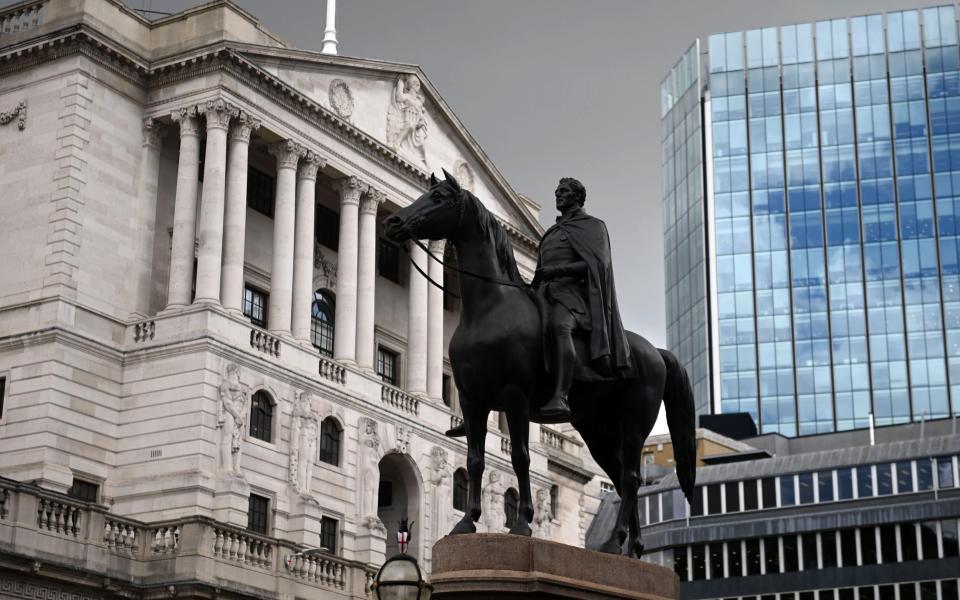
Bond markets were tossed into turmoil on Thursday, threatening a brand-new home mortgage shock for property owners in the middle of worries that the Bank of England has actually lost control of inflation.
Britain’s loaning expenses increased to the greatest in the G7 for the very first time considering that the monetary crisis as Legal & & General, among the City’s most effective possession supervisors, stated it had actually stopped making long-lasting financial investments in the UK financial obligation market due to the fact that of financial unpredictability.
The chaos set off an instant action from lending institutions, with Nationwide, Britain’s greatest structure society, raising rates by approximately 0.45 portion points throughout its home mortgage variety
Market ructions, brought on by worries that inflation is staying stubbornly high, have actually sent out loaning expenses rising back to levels last reached throughout then-prime minister Liz Truss’s “mini-Budget” crisis.
Sonja Laud, primary financial investment officer at Legal & & General Financial investment Management, stated: “The inflation information that we got the other day in the UK will put a great deal of pressure on the Bank of England in getting this balancing act right.
” There are inflationary pressures [in the UK] that plainly are still greater than what we see in other places in Europe or the United States.
” We are looking more tactically at gilts due to the fact that with the volatility at hand there are chances. However we are not taking part in the longer term, just due to the fact that of the absence of a clearer story.”
The yield on ten-year financial obligation increased by nearly 0.2 portion points on Thursday to 4.37 pc, putting it above Italy’s rate of 4.35 pc.
It is the very first time British yields have actually topped the G7 group of innovative economies considering that the dawn of the monetary crisis in 2007. Even at the height of in 2015’s mini-budget chaos, Italy’s loaning expenses were still above Britain’s.
The boost is a considerable difficulty to the trustworthiness of the Chancellor Jeremy Hunt and Andrew Bailey, Guv of the Bank, who looked for to provide themselves as qualified financial supervisors after the turmoil of Ms Truss’s short premiership.
It follows markets were alarmed by all of a sudden strong inflation information on Wednesday revealing that rates increased by 8.7 pc last month, considerably more than the Bank’s expectations of an 8.4 pc boost. Britain’s inflation rate is easily the greatest in the G7 and there are increasing issues that it is being driven by wage development instead of external shocks, making it even harder to include.
Traders now anticipate rate of interest to increase to 5.5 pc by the end of the year, up from 4.5 pc at present.
Rates in the swap market, which is utilized to rate home mortgages, have actually leapt as an outcome, requiring lending institutions to react.
Lloyds, Virgin Cash and Halifax all revealed little home mortgage rate increases on Thursday, with more huge lending institutions anticipated to do the very same in the coming days.
Gary Greenwood, a banking expert at Coast Capital, stated: “Other banks will require to do the same if swap rates remain at their brand-new level, which will rise the expense of loaning for property owners that have home mortgages therefore capture home financing.”
Virgin Cash increased its rates by approximately 0.12 portion points, while Lloyds and Halifax increased rates by approximately 0.2 points.
Nationwide stated it was increasing rates throughout its brand-new organization, extra loaning, switcher and existing client moving house varieties. The 0.45 portion point boost will include around ⤠60 a month to the expense of a common ⤠250,000 home mortgage.
A Nationwide spokesperson stated: “In the present financial environment, swap rates have actually continued to change and, more just recently, boost, resulting in rate increases throughout the marketplace. This modification will guarantee our home mortgage rates stay sustainable.”
Britain’s ten-year loaning expenses were the 4th least expensive in the G7 at 0.4 pc when Covid struck in March 2020.
Throughout the mini-budget crisis in 2015, 10-year gilt yields soared to 4.5 pc as financiers wager that Ms Truss’s policies would be inflationary, putting Britain 2nd behind Italy.
Analysts declared that the UK was suffering a “idiot premium” as financiers required money in return for its political and financial instability.
Mr Hunt later on ditched nearly all of the mini-budget reforms after changing Kwasi Kwarteng as Chancellor, and assured markets by pledging to take “hard choices” on costs.
Loaning expenses was up to simply above 3pc when Ms Truss lost power.
Nevertheless, they have actually approached once again in subsequent months after the Bank of England showed far too bleak on financial development and anticipated that inflation would fall far more rapidly than it has.
The current chaos might threaten to harm Prime Minister Rishi Sunak’s credibility for sound financial management.
In November, Mr Sunak stated “errors were made” by Ms Truss and he swore to make “hard choices that are needed to repair” her mistakes.
Speaking in Washington on Thursday, Jonathan Haskel, an external member of the Bank of England’s Monetary Policy Committee, stated: “Additional boost in Bank Rate can not be eliminated.”
” Inflation might continue well beyond the regards to trade shock if characteristics in labour and capital earnings ended up being ingrained.”
He included: “Early indications of loosening up in the labour market have actually not sufficed to eliminate this danger.
” I see it as still really tight in an outright sense. The job to joblessness ratio and system wage development are both traditionally high.”